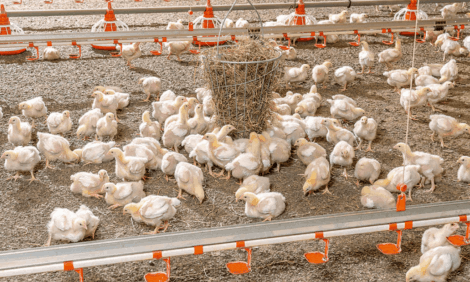



Effects of Feeding Different Postbiotic Metabolite Combinations on Egg Quality and Production Performance of Laying Hens
Post-biotic metabolite combinations can be used in the feed to increase productivity from hens without raising the risk of antibiotic resistance, according to new research from Malaysia.Probiotics are beneficial bacteria that are able to colonise the host digestive system, increasing the natural flora and preventing colonisation of pathogenic organisms and thus, securing optimal utilisation of the feed, according to Teck Chwen Loh and colleagues at Universiti Putra Malaysia in BMC Veterinary Research.
They say that commercial probiotics, however, often do not meet the expected standards and the viability of the efficacy of these strains remains questionable. Another major issue has been highlighted in relation to the application of antibiotic-resistant probiotics; the antibiotic-resistant gene can be transferred between organisms. Recently, postbiotic metabolites produced from microbes have been extensively studied as feed additive in order to substitute in-feed antibiotics.
In their experiment, they found no significant difference (P>0.05) between the treatment groups in overall feed intake, egg weight, egg mass and feed conversion efficiency.
COM456 had a significant reduction (P<0.05) in faecal pH compared to the other groups at 28 weeks of age onwards. It also resulted in a significantly higher (P<0.05) level of lactic acid bacteria counts from 30 weeks of age onwards, followed by COM246 and COM345 at 32 and 34 weeks of age, respectively.
A significant reduction of faecal Enterobacteriaceae (P<0.05) were observed with COM246 and COM456 from 30 weeks of age onwards.
The lowest levels (P< 0.05) of plasma and egg yolk cholesterol were observed in COM456, followed by COM345 and COM246.
There was no significant difference in terms of yolk weight between the treatment groups.
Significantly higher (P<0.05) content of C18:3, C20:2 and C22:6 were found in treatments supplemented with metabolite combinations than in the control group.
Loh and co-authors conclude the present study demonstrates the positive effects of metabolite combinations supplementation in laying hens.
An increase in hen-day egg production was observed in all treatments supplemented with metabolite combinations.
In addition, the metabolite combinations, COM456 had reduced the faecal pH and faecal Enterobacteriaceae population, improved the faecal lactic acid bacteria, reduced the plasma and yolk cholesterol and improved the faecal volatile fatty acids content.
Postbiotic metabolite combinations can be used as an alternative feed additive to achieve high productivity and better animal health while reducing the use of conventional chemotherapeutic agents such as in-feed antimicrobials.
Reference
Loh T.C., D.W. Choe, H.L. Foo, A.Q. Sazili and M.H. Bejo. 2014. Effects of feeding different postbiotic metabolite combinations produced by Lactobacillus plantarum strains on egg quality and production performance, faecal parameters and plasma cholesterol in laying hens. BMC Veterinary Research. 10:149 doi:10.1186/1746-6148-10-149
August 2014











